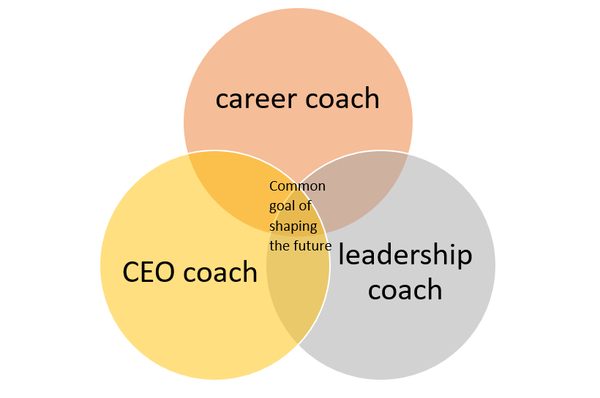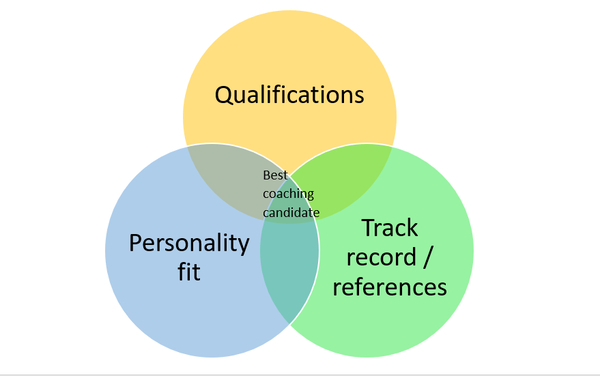THE WORLD’S #1 EXECUTIVE COACHING AND BUSINESS COACHING BLOG SINCE 2017.
The Comprehensive Guide to Career Coaching
Published On: August 3, 2018 | Last updated on: August 30, 2022 | Author: John Mattone | Category: Blog, Executive Coaching
Many of us enter a profession by choosing a particular major in college, perhaps earning an advanced degree, and eventually searching for and finding a job relevant to our interests and qualifications.
Career aspirations may start at a young age, but things don’t always proceed as we imagined.
It sounds simple, but most people who have been there know that it’s anything but simple. Rarely does the ideal job opportunity that perfectly matches our qualifications, interests, and other preferences (like location, work hours, or working environment) show up at the exact time we need it.
Compromise is a common thread running through many people’s careers because they believe they will have to give up something in order to have the overall life quality they want. And while insisting that a job offer check every last box on a checklist of desirability is a sure path to long stretches of unemployment, it’s not always healthy to take a job just because it’s a paycheck.
Grappling with this balancing act is part of many professionals’ lives, in just about any stage of their career. Career coaches can be terrific resources for those at career crossroads. But they can also be great resources for people who are happy with their jobs and want to make the most of their advancement opportunities. Here is what you should know about career coaching, and how it has the potential to improve your career and your life, no matter what stage of your career you’re in now.
What Do Career Coaches Do?
Most of us naturally turn to friends and family as sounding boards for job issues, but their utility is limited at best. While it’s great to have someone to whom you can kvetch after a particularly grueling week, getting and keeping your career on track requires something more – something that can be provided by the right career coach.
Career coaches help guide their clients through many different kinds of milestones, like going back to school, adjusting career track, getting back into a career after taking time out to raise children, or suddenly being made into a team leader. Career coaches can also help clients prepare for situations like raise and promotion negotiations, and to know when it’s time to look to different employers for new opportunities.
What career coaches offer that no one else does is a perspective that is just removed enough from the client’s situation to see things clearly, while still retaining empathy for the client’s situation. Some of the most common reasons people seek the services of a career coach include:
- They’re stuck in a career rut
- They’ve sent out countless resumes, but haven’t heard back
- They want to make some sort of career transition
- They are worried about “interview paralysis”
- They don’t feel confident networking
These aren’t the only reasons people enlist the services of career coaches, so career coaching may be appropriate for you whether or not your situation matches one of the ones listed.
How Do Career Coaches Differ from CEO Coaches and Leadership Coaches?
CEO coaches and leadership coaches typically provide their services for a smaller subset of the professional population. CEO coaches tend to work with C-level executives: CEOs, CIOs, CMOs, and others at the very top of the organizational chart. Top-level executives have different priorities and pressures than even the highest-level journeyman engineers, accountants, or nurses.
Leadership coaches, similarly, work with clients who are taking on leadership responsibilities, often from having been “in the trenches” designing safety equipment, producing annual financial reports, or creating sales or marketing campaigns. While becoming a team leader in such a situation still requires in-depth knowledge of the various “how-tos” related to the job, it also requires leadership skills, which are skills just like any other, in that they need to be learned and practiced in order to be effective.
Career coaches, CEO coaches, and leadership coaches have some things in common.
A career coach may help a professional at any stage of their career. Someone three or five years into their career may wonder if the time is right to earn a post-graduate degree, and a career coach can help with that thought and planning process. The 40-year-old faced with relocating because of a spouse’s career wants to maximize their opportunities at the new location, and the career coach can help here too. Someone within a decade of retirement may want to plan the best way to wind down a career and develop a way to do consulting part-time after retirement. A career coach can help with this as well.
Early-Career Benefits of Career Coaching
Those first few years as a professional in a given field are unlike others. It’s an exciting time for sure, but it also requires learning far more than just how to do the job. People new to a profession are also busy learning who is responsible for what, how the career and promotion ladder works, which manager has which management style, and much more.
Sometimes, a person with a couple of years under their belt may wonder if they’ve chosen the right profession at all. In many cases, these types of career woes can be addressed with the right career plan, and the career coach can help their early-career clients develop one.
The early-career professional who loves what they do, but doesn’t feel like a good fit with a particular employer may wonder if looking elsewhere is a good idea. Or they may wonder if starting their own professional practice is worthwhile. While family and friends should certainly be ready to listen and respond to these issues, a career coach is ready to be realistic and frame the situation from a unique, more impartial perspective that can be amazingly valuable.
Mid-Career Benefits of Career Coaching
Many parts of life are typically in high gear for people who are in the middle phase of their career. They’ve established themselves and perhaps received promotions and raises, and they may have a lot going on outside the workplace as well, with children growing up and needing time and attention, and maybe a home that needs to be maintained, as well as friendships that may be harder to keep up as families go about their busy lives.
The career coach, of course, helps clients focus on the professional dimension of their lives, but this can often have positive effects that carry over into other, non-work environments too. A mid-career professional who is miserable at the prospect of being bypassed by others in their career trajectory will naturally carry some of that home with them at the end of the day.
Again, the career coach offers the removed, yet empathetic perspective that can help the mid-career professional develop a strategy to direct their career during this challenging phase. The strategy may involve making their existing work more visible to management or asking for new responsibilities (or a new job title), or it may involve looking for a new employer – a process that is different for the established professional than it is for someone just starting out.
Late-Career Benefits of Career Coaching
Changes in the American economy have affected professionals well into the latter years of their careers. The Great Recession of ten years ago had many people who were approaching the last phase of their careers lose their jobs, or lose their chances at plum promotions. Many older workers found themselves having to change careers altogether, or having to create their own careers in the new gig economy.
Career coaching for the person in the last decade or so of their professional life can make the difference between slogging on until retirement mercifully arrives while figuring out how to compete with workers half their age, and developing a professional plan that preserves what’s best about their existing career while being prepared for potential obstacles.
Perhaps more so than with CEO coaches or leadership coaches, the career coach has a keen understanding of a professional’s personality, dreams, and disappointments, and knows how to make use of all of these to create an actionable plan going forward. That’s valuable no matter what stage a person’s career is at.
Career coaching may be appropriate at any career stage.
Career Coaching Qualifications
Calling oneself a “career coach” and hanging out a shingle is something many people have tried, regardless of their qualifications or aspirations. There’s nothing stopping a person from doing it, and fortunately for people seeking career coaches, such fly-by-night coaching services usually don’t stick around long enough to snag very many vulnerable clients.
It’s not easy vetting the qualifications of someone calling themselves a career coach. When you hire a lawyer, you can make sure they are licensed to practice, and the same is true of contractors, hair stylists, and medical practitioners. The same isn’t true with career coaches, although there are career coach training programs available.
The good news is that it’s far easier now than it was a decade ago to learn about the qualifications of someone advertising themselves as a career coach because of the internet. In the old days, you may have to meet by phone or in person to determine whether a career coach was qualified, and then follow up with references they provided. This is still the smart thing to do, but you also have access to numerous online resources.
The best career coaches know of the power of content creation, and many of them have blogs, YouTube channels, podcasts, and strong social media presences. Exploring these channels helps you learn more about these coaches, as well as the types of issues they focus on, their style, and how they relate to clients. This information can be tremendously valuable in deciding whether you and a particular coach “click.”
Don’t compromise when it comes to the fundamental qualifications you expect from a career coach.
How to Choose a Career Coach
The first steps to choosing a career coach are knowing when you need to reach out to one and knowing what your goals are. “When to reach out” can be tricky. It’s best to reach out before you have reached critical mass and have either lost your job or are an inch away from quitting. Ideally, you should reach out as soon as you realize you’ve gone off-track, but it’s not always to tell whether you’ve gone off-track or have just had a couple of bad weeks. Persistent feelings of disappointment with work that you can’t tie to a specific event, like an end-of-year push, or an interaction with a particularly difficult customer, are indications that talking to a career coach could be a good idea.
Likewise, if you don’t have a clue where you want your career to go – you’re just miserable all the time the way things are – then you may not be in the best position to use a career coach’s services optimally. Think about your career goals and aspirations. If you could wave a magic wand that would put you in your dream career, what would that dream career look like? Maybe it looks just like your career does now, except you earn 50% more than what you do. If so, a career coach may be able to help you learn to negotiate a raise (or a new job elsewhere).
Results to Expect from Career Coaching
Many different types of career coaching “packages” are available, so it’s impossible to say exactly what you can expect. However, there are commonalities among strong career coaching relationships. First, you should expect an initial “intake” meeting where you talk about the services you will receive, what you can expect from your coach, and what your coach will expect from you. At this time, your coach will probably explain how much one-on-one time you’ll spend with your coach, and how and when it’s OK to contact them with questions or updates.
Even before your first phone or in-person contact with your coach, you may receive via email a list of questions, or perhaps an assessment of some kind to help your coach understand you better at the first meeting. When you have a scheduled meeting with your coach (whether by phone, in person, by video conference, chat, etc.), you should expect their full attention. After all, that’s what you’re paying for.
Expect regular one-on-one communication with your career coach.
Expect to have homework and to discuss that homework at your next meeting. You should also expect honest, constructive feedback. Your coach may have you set clear objectives, like meeting with a senior staff member to talk about your career aspirations and learn from their experience before your next coaching session. You would then talk about this experience and learn what you can from it.
As your coaching relationship comes to its conclusion, your coach will likely solicit feedback from you that will help both of you going forward. Your coach may ask which of your personality traits you had to draw on to complete your objectives, or what you wish you could tell your pre-coached self. And you may be asked for feedback on what specifically about the coaching setup worked well and what could have worked better. At this point, you may set up a follow-up call for a few months in the future, so your coach can check in with you on longer-term progress.
How to Make the Most of Career Coaching
Three keys to making the most of a career coaching relationship include knowing when it’s time to seek career coaching, choosing a career coach carefully, and committing to doing the homework and really listening to your coach.
As mentioned before, it’s not ideal to wait until your professional life has imploded before reaching out to a career coach. It’s best to recognize the signs of a career that could derail and reach out before that can happen. Choosing the right coach will probably require that you engage with several, probably starting online. From there, you can narrow down your search to the two or three that seem to have the best “fit” for your personality and the best qualifications. Then you can speak to each in more depth before making your decision.
Finally, if you’re committed to the process of career coaching, you’re halfway to success. Coaching is a two-way street, and your coach can’t magically make your career better without your active participation. For professionals in any career stage, career coaching can be a way to better manage and direct their future, and make sure their career works as well as possible within their overarching life goals.
While leadership coaching and CEO coaching tend to be more targeted than career coaching, the end results are similar: professionals who are more competent and confident, and who are more capable of fulfilling goals.
Glossary of Terms
Career coach – a coaching professional who helps people in many different career tracks and career stages to maximize their professional effectiveness and shape their professional futures
CEO coach – a coaching professional who works with top-level (C-level) executives to help them maximize their effectiveness as executives, identify blind spots, and understand their strengths and weaknesses
Early career – the first few years of a professional career, when a person is likely figuring out how they want their career trajectory to proceed, and what additional qualifications they may need
Late career – the last decade or so before retirement, when a professional considers their professional legacy, and how they envision their career winding down, whether they will continue working part-time after retirement, etc.
Leadership coach – a coach who, similarly to the CEO coach, works with people in leadership positions, helping them balance the leadership skills required with the standard, professional skills they must also demonstrate on the job
Mid career – the middle years of a professional career, often accompanied by a busy home life and life in a community
Vetting – the process of narrowing down career coaching candidates through online research, one-on-one contact and conversations, and evaluation of a candidate coach’s qualifications, track record, and references






